

E-Governement (New Public Managment) Cognition Dynamics. Innovation (Open enquiries) Materiality. Economic Sociology. Semantic Web. Big data. Data Visualization. Licence Ouverte / Open Licence. Dans le cadre de la politique du Gouvernement en faveur de l’ouverture des données publiques (« Open Data »), Etalab a conçu la « Licence Ouverte / Open Licence ».
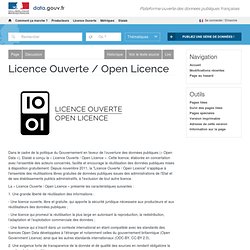
Cette licence, élaborée en concertation avec l’ensemble des acteurs concernés, facilite et encourage la réutilisation des données publiques mises à disposition gratuitement. Depuis novembre 2011, la "Licence Ouverte / Open Licence" s'applique à l'ensemble des réutilisations libres gratuites de données publiques issues des administrations de l'Etat et de ses établissements publics administratifs, à l'exclusion de tout autre licence. La « Licence Ouverte / Open Licence » présente les caractéristiques suivantes : 1. Une grande liberté de réutilisation des informations : Open data. Open Knowledge Foundation Blog. Open Data Hackathon How to Guide. Science & Technology Studies. Science & Technology Studies. The Actor Network Resource: Thematic List of Publications. EASST. Bruno-latour.fr. ConceptsinSTS - Boundary Objects (Jalbert)
Overview Boundary objects as locations to study individual practices in institutional arrangements was gradually developed by Susan Leigh Star, Geoffrey Bowker, and James Griesemer throughout the 1990s sociology projects focusing on post-normal science. While its use has extended significantly into other fields, boundary objects were originally defined as: "[T]hose objects that both inhabit several communities of practice and satisfy the informational requirements of each of them.
Boundary objects are thus both plastic enough to adapt to local needs and constraints of the several parties employing them, yet robust enough to maintain a common identity across sites. They are weakly structured in common use and become strongly structured in individual-site use.” Common Points of Reference A boundary object, when identified by multiple communities, serves as a common point of reference to facilitate conversation around contested issues.
Bijker, W.B., Hughes, T., and Pinch, T. Paul Leonardi. Paul Leonardi (Ph.D., Stanford University) is the Pentair-Nugent Associate Professor at Northwestern University.
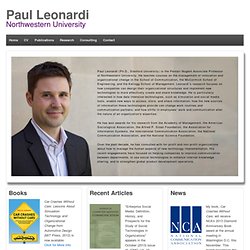
He teaches courses on the management of innovation and organizational change in the School of Communication, the McCormick School of Engineering, and the Kellogg School of Management. Leonardi’s research focuses on how companies can design their organizational structures and implement new technologies to more effectively create and share knowledge. He is particularly interested in how data intensive technologies, such as simulation and social media tools, enable new ways to access, store, and share information; how the new sources of information these technologies provide can change work routines and communication partners; and how shifts in employees’ work and communication alter the nature of an organization's expertise.
He has won awards for his research from the Academy of Management, the American Sociological Association, the Alfred P. AboutMacospol < MappingControversies.net. Democracy is the possibility to disagree.
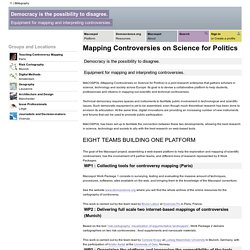
Equipment for mapping and interpreting controversies. MACOSPOL (Mapping Controversies on Science for Politics) is a joint research enterprise that gathers scholars in science, technology and society across Europe. Its goal is to devise a collaborative platform to help students, professionals and citizens in mapping out scientific and technical controversies. Technical democracy requires spaces and instruments to facilitate public involvement in technological and scientific issues. Such democratic equipment is yet to be assembled, even though much theoretical research has been done to envision its articulation.
The goal of the Macospol project, assembling a web-based platform to help the exploration and mapping of scientific controversies, has the involvement of 8 partner teams, and different lines of research represented by 8 Work Packages. WP1 : Collecting tools for controversy mapping (Paris) WP8 : Managing the Macospol project (Paris) 1. Centre de Sociologie de l'Innovation - Center for the Sociology of Innovation. University of Salford. "There is a popular tendency in management science towards what could be called “theory denial”: the denial of the significance of theory for the development of management thought and action.
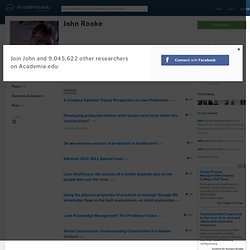
We contend that this theory denial is just wrong, in the light of empirical evidence, and that is a damaging idea, because it diverts the attention of the scholarly community away from the core issues of the field. In this paper, we consider two variants of this theory denial, purporting to reveal the serious problems in their justification. First, the approach stressing the importance of studying how ideas are translated into solutions by organizations is considered.
It is shown that there two unsubstantiated assumptions, first about the relative lack of importance of the (solution) idea, and second about the prior existence of such ideas. Research Centres, Groups & Networks. EGOS - European Group for Organizational Studies - Current SWGs. EGOS has currently 15 Standing Working Groups (SWGs).
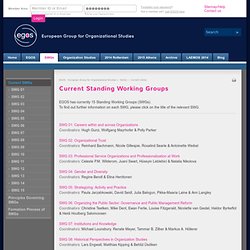
To find out further information on each SWG, please click on the title of the relevant SWG. SWG 01: Careers within and across Organizations Coordinators: Hugh Gunz, Wolfgang Mayrhofer & Polly Parker.